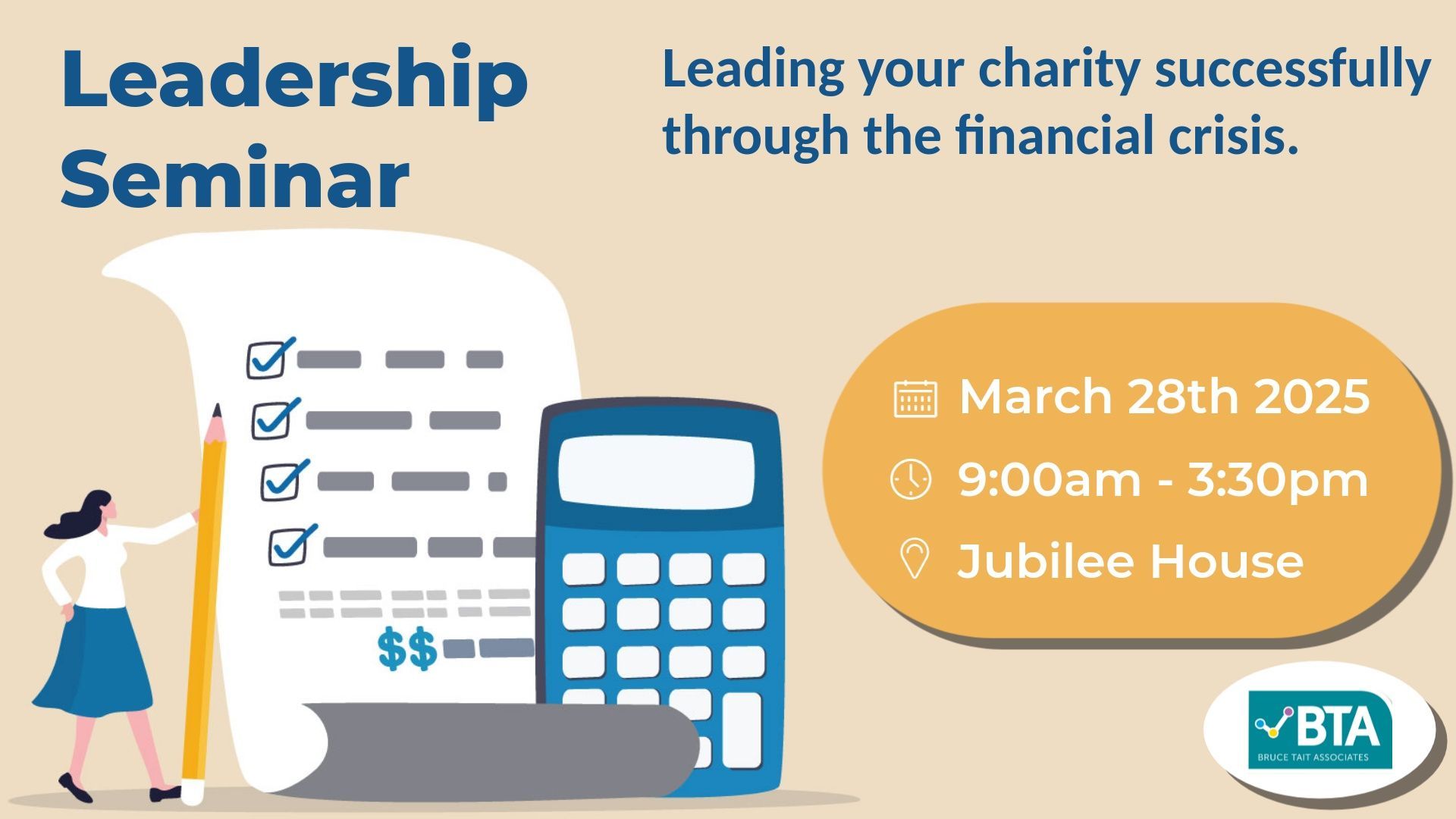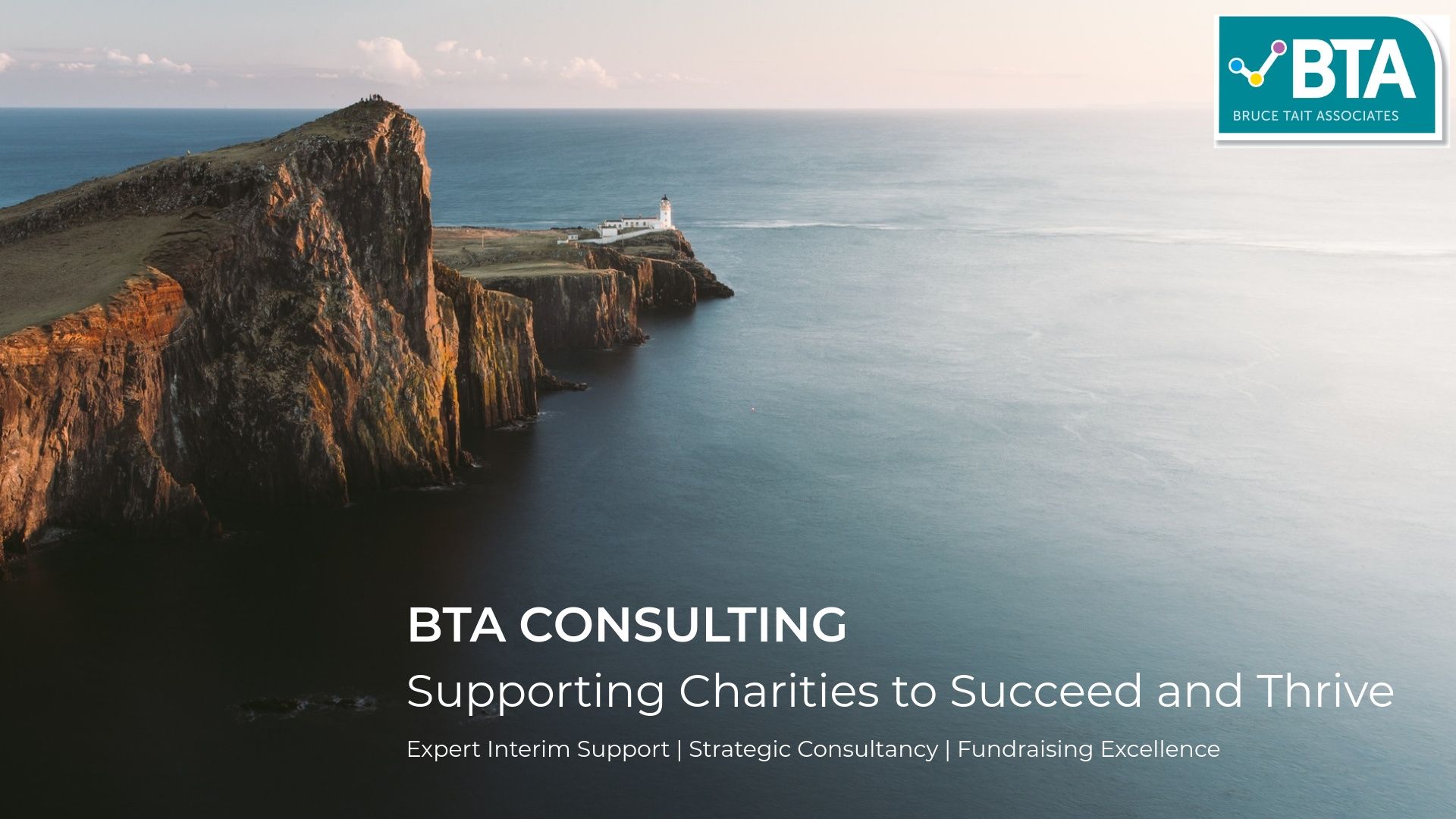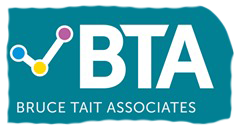News and views.
What's going on at BTA and in the wider charity world? We also love to share our knowledge of the third sector - with top tips on everything from finding the right job to managing a multi-generational workforce.

Our BTA Rewards Review 2025 targeted specifically for small and medium-sized Scottish non-profit organisations notes that perhaps unsurprisingly, all respondents used emails and in-person conversations as their preferred communication tools. Just over a third used notice boards (36.4%) and workplace forums (36.4%), while staff intranets and town hall meetings appear uncommon in the sample. The scores participants gave to the effectiveness of their respective workplace communications ranged from 2 to 4, with an average of 3.3. Notably, no respondent gave their organisation the lowest (1) and highest (5) possible rating. The Opportunities Review your management activities and ask whether your appraisals and in-person informal conversations are effective or whether other activities like focus groups, and pulse surveys may support your communications more effectively. Open and transparent communications can extend employee voice beyond work-related topics. With a focus on Non-harassment policy since the Worker Protection Act 2023 introduced on 26 October 2024, organisations should be reviewing their risk assessments, and whether they have an up-to-date harassment policy in place. Do you provide workplace harassment prevention training and do you conduct a workplace harassment risk assessment? Importantly, do you feel that your employees feel comfortable discussing these issues with you? Want to find out more about Pay, Benefits, Culture, and Communications? Download the BTA Reward Review 2025, press here.

Thinking about the various outcomes of organisational culture, almost all of our respondents felt that culture positively impacts employee attitudes and 9 in 10 respondents felt their culture positively influenced staff retention and their brand image. Culture was seen as a driver of a sense of purpose and direction for 81.8% of respondents. Lastly, 72.7% of respondents felt their organisational culture has a positive impact on income generation through sources such as fundraising and grants. Want to find out more about Pay, Benefits, Culture, and Communications? Download the BTA Reward Review 2025, press here.

Based on our recent BTA Rewards Review of small and medium-sized Scottish non-profit organisations, pay awards in 2024-2025 ranged between 2.5% - 7%. The average 4.4% pay award appeared driven largely by increases in the Real Living Wage. The planned pay awards of our respondents were in the region of 2% - 5%, with an expected average of 3.25%. This is largely in line with the CIPD’s recent Labour Market Outlook which expects a median 2025 pay award of 3%, down from a pre-budget expectation of 3.5%. Inflation remains the key driver of pay awards in our sample. The Bank of England Monetary Policy Report suggests that ‘Inflation is following a bumpy path. It will increase temporarily in 2025, and likely to rise to 3.7% over the first half of the year, before falling back to the 2% target.’ The Bank continues to caveat this by stating that there may be ‘global shocks’ such as ‘global tariffs or developments in the Middle East’ that may affect their projections. There is more to pay determination though, with almost half of our respondents considering individual performance, competencies, and market rates when determining their pay awards. Over half of respondents operate no pay structure/framework and of those who do, only 60% are transparent. Want to find out more about Pay, Benefits, Culture, and Communications? Download the BTA Reward Review 2025: Press here

Date: Friday 27th March Time: 9:30am - 3:30pm Location: Jubilee House, Stirling Cost: £60 (Half Day) | £95 (Full Day) (Excluding VAT) Lunch available for an additional £7 per person Overview Charities are facing unprecedented pressures on their resources as they try and navigate through the current economic turmoil. With emerging public sector cuts, increased demand placed on Trust and Foundations and public giving being squeezed the prospects, for many, are far from optimistic. But there are things to consider that may help Leaders through. This Leadership Seminar will provide you with appropriate insight, knowledge and strategies that will help you in the months ahead. Aimed at Chief Executives, Directors, and Senior Managers, the seminar will explore practical solutions that include helping you: a) understand the impacts of changes to NIC and other national government policies. b) sharpen up your fundraising Case for Support and why this matters to funders. c) explore the world of public sector contracting, learning what it takes to be successful in bidding for work. d) understand how reshaping your organisation could work to your advantage. What You Will Learn By attending this seminar, you will: • Gain a deeper understanding of the financial pressures facing the charity sector today, including the impact of National Insurance Contributions (NIC) increases. • Learn strategies to improve your fundraising efforts, particularly in securing trust and foundation funding. • Discover effective ways to approach public sector contracting and how to enhance your bidding prospects. • Explore methods to shape your organisation to be resilient, thus reducing your risks and exposures leading you towards financial sustainability. • Understand how to build your Fundraising Case for Support which will connect with funders, donors and philanthropic organisations. • Appreciate what it is like for your peers and similar organisations that are faced with challenges similar to you. Session Schedule Morning Sessions (before lunch) 1. Maximising Fundraising from Trusts Speaker: Deanna Wolf An overview of how to approach trusts for funding, including strategies for improving applications and building long-term relationships. 2. Creating a Case for Support Speaker: Shona Blakely Learn how to create a compelling narrative that clearly demonstrates your organisation’s value and impact to potential funders. Afternoon Sessions (after lunch) 3. Better Bidding for Public Sector Contracts Speaker: Gill Joy, Managing Director of Intend A guide to effectively bidding for public sector contracts and securing essential funding opportunities. 4. Organisational Design for Financial Resilience Speaker: Andrew Penker Explore practical steps to design a more efficient and resilient organisation, ensuring your charity remains sustainable in tough financial times. Why Attend? This is an opportunity for you to learn from our experts on how their advice and recommendations can help you navigate these financially challenging times. They will challenge you to think about (a) what you can do differently and (b) why embracing alternative strategies just may make the difference. The session will also give you the opportunity to mix with peers, many of whom will share your own concerns and issues. Who Should Attend? This session is aimed at those that have strategic responsibility for the income generation activity of their charity, and for ensuring its long term financial sustainability. You will be a Chief Executive, Director or Senior Managers. We also encourage charity Chairs to consider attending too. Book Your Place Spaces are limited, so don’t miss this opportunity to gain valuable insights from leading experts. Register now to secure your place at this informative and practical seminar.

As we enter our 18th year of delivering expert consultancy, we’re taking a moment to reflect on the journey that has brought us here and the exciting road ahead. For nearly two decades, we’ve been proud to partner with charities, providing tailored solutions, impactful strategies, and unwavering support to help them thrive in an ever-changing landscape. Today, we’re thrilled to unveil a refreshed look at how we present that support—our newly updated consultancy brochure. We invite you to take a look at our new brochure and discover how we can help your charity thrive. Whether you’re seeking strategic direction, fundraising expertise, or governance support, our team is here to provide the tools and guidance you need. Thank you for being part of our journey over the past 18 years. We look forward to continuing to support charities in creating lasting impact for years to come.

The Government’s new Employment Rights Bill termed ‘Labour’s New Deal for Working People,’ will ‘ban exploitative practices and enhance employment rights’ but should non-profits, social impact, and charity organisations be worried? What should you prepare for? The headline changes are likely to include: • Ban zero-hour contracts: Legislation will ensure workers have a right to contract reflecting the number of hours they regularly work, with reasonable notice of any change in shift patterns. • End Fire and Rehire or Fire and Replace: the government will reform the law to provide effective remedies and replace the previous statutory code. • Provide day-one rights on parental leave, sick pay and protection from unfair dismissal for all workers, although employers will be able to operate probationary periods while they assess new hires. • Remove the lower earnings limit on Statutory Sick Pay so it is available to all workers, and get rid of the three-day waiting period. • Make flexible working the default from day one for all workers, with “employers required to accommodate this as far as is reasonable.” • Make it unlawful to dismiss a woman who has had a baby for six months after her return to work, “except in specific circumstances.” • Establish a new Single Enforcement Body, the Fair Work Agency, to monitor the enforcement of workplace rights. • Set up a Fair Pay Agreement in the adult social care sector. If this works, it will assess whether such agreements could work in other sectors. • Reinstate the School Support Staff Negotiating Body to establish national terms and conditions, career progression and pay rates for teachers and other school staff. • Remove “unnecessary restrictions” on trade union activity, including the Strikes (Minimum Service Levels) Act, to ensure industrial relations are based around “good faith negotiation and bargaining.” • Simplify the process of statutory recognition to ensure workers have a reasonable right to access a union in their place of work. Impact Peripheral workers will gain more rights to stable employment, and permanent employees will benefit from more flexibility as to how and where they work. This has implications for the training of Managers and Team Leader/Supervisors, who will have to manage probationary periods much more effectively, measuring performance and potential within reasonable but short time periods. Pay differentials will need to be more clearly defined to ensure that this additional management requirement is recognised and rewarded otherwise Supervisory roles in other sectors will become more attractive. Assessing whether roles can operate remotely will need to be clearly evaluated and assessed to ensure compliance, and a ‘reasonable’ approach to flexible working requests will need to be defined and put into practice effectively by Managers and Supervisors. Reward Survey: Join other organisations in the non-profit and social impact sector and complete the BTA Reward Survey to share your opinion on how legislative changes will impact the pay differentials and roles within your organisation, and discover what other organisations are either doing or planning to do in the future in terms of their future pay awards, rates of pay, and other relevant aspects of employment. https://www.surveymonkey.com/r/BTARewards2024

Over the last 3 years, I have been conducting numerous pay and benefits benchmarking exercises as part of my role as an HR Associate with BTA (Bruce Tait Associates), the leading Recruitment and Consultancy for the non-profit and social impact sector. I have noticed that increasingly organisations are concerning themselves with their benefits in addition to their levels of pay. This is significant as areas such as flexible working have become more prominent in the post-pandemic work environment. Having a structure helps organisations consider the benefits they may wish to offer, and then track their value to the organisation in terms of how they attract, engage, and retain their workers. Pay and Benefits: In the most recent BTA Rewards Scoping survey (August 2024), the top 2 key areas of interest for respondent organisations were: 1. Pay rate (current and planned increases (76.7%) 2. Benefits (66.7%) It is noteworthy that Work-life blend was of interest to 1 in 3 organisations (36.7%). Benefits can be broken down into the following elements, with some illustrative examples: Work Hours - flexible working, locations Financial Pension - Independent financial advice, rewards platform Health - Employee Assistance Programme (EAP), Health Cash Plan (HCP), Occupational health Leave Annual -Buy &/or Sell, Family friendly Learning & Development Induction - Access to courses, conferences, networking Pensions are often cited as the most important financial benefit given that employers must automatically enrol their workers into a pension scheme and make contributions to their pension if they're eligible for automatic enrolment. The levels of contribution can, however, vary significantly and employers should identify the importance of the contribution levels for workers based on the stage of their career rather than just offering a pension. Benchmarking: Most organisations will confine their benchmarking activities to focus on their direct competitors, which may be of a similar size and shape, with similar levels of affordability, and in the same sector. This is helpful but have you ever stopped to ask your team members which organisations they may leave your organisation to work for, and in which sector they may be most attracted to work within in the future? Having an awareness of these indirect competitors may be helpful when considering the values your workers place on the benefits you provide. Benchmarking using an external party can provide objectivity and ensure the rewards package offered to your workers is optimised and affordable. Reward Survey: Join other organisations in the non-profit and social impact sector and complete the BTA Reward Survey to share your opinion on the benefits you are currently offering, and discover what other organisations are either doing or planning to do in the future with the level and range of their benefits as they seek to attract, and retain their team members. Link to Survey: https://www.surveymonkey.com/r/BTARewards2024

Well, this was the message delivered to Amazon Corporate Office team members recently. You likely saw the message through your usual news feeds i.e. BBC News. The significant point to note is that it is not applicable to all Amazon team members but to those in the owned corporate offices rather than the leased contact centres, who will remain working remotely. Return to the Office: The headline turned heads and return to the office is becoming an increasingly emotive subject and one which may be more realistic, as according to the KPMG 2024 CEO Outlook report, which surveyed 1,300 CEOs around the world – including 150 in the UK, more than four-fifths (83 per cent) of UK CEOs expect to see a full return to the office within three years, up 19 percentage points from last year. Are you thinking about making any changes to the hours of work in your organisation? Do you know what other organisations in your sector are planning to do? Employee Value Proposition: An Employee Value Proposition (EVP) is a unique set of benefits and values that an organisation offers to its employees in exchange for their skills, experience, and commitment. A strong EVP helps attract, engage, and retain top talent by clearly communicating what makes the organisation a great or preferred place to work. The elements that comprise an EVP can include: • Work-Life Balance/Blend: Flexible working hours, remote work options, and leave policies. • Pay: Salary, bonuses, and other financial rewards. • Benefits: Pensions, Insurance, and other. • Career Development: Opportunities for growth, training, and advancement. • Company Culture: The organisation’s values, mission, and social purpose. Home or Remote working: Have you introduced a home-working policy, and do your terms of employment state a specific place of work i.e. the office or your employee’s home? If you changed your working practices to become more flexible post-pandemic, has hybrid working become your ‘new normal’ over the last few tears? Do you know how important it is for your team members to have flexibility over their place of work? The answer to these questions may influence how you approach making any future changes to the current working arrangements with your team members. The How: Recognising your obligations to consult team members about any changes, and how you wish to be perceived as an employer who listens to their team members, is important if you wish to become or maintain your status as a great or preferred employer. Reward Survey: Join other organisations in the non-profit and social impact sector and complete the BTA Reward Survey to share your opinion on flexible working as well as pay and benefits, and discover what other organisations are either doing or planning to do in the future. https://www.surveymonkey.com/r/BTARewards2024

The key to any successful sustainable organisation will inevitably centre on its relationship with people – both staff and those that you serve. But it’s not just a matter of proper consideration of your responsibilities under Employment law, Health & Safety legislation or even your funding criteria – increasingly it is how you truly centre people at the heart of everything you do including your strategy, your values and the culture you aim to promote. The UN Sustainable Development Goals (SDGs) aim to bring together Governments; Business; NGOs and local communities in a common cause that makes our world more sustainable for everyone, but it is also a challenge to be more accountable for our actions. Whatever the size of your charity, you need to ensure that the voices of your staff, clients and external stakeholders are effectively embedded in the way that you operate and increasingly your funders will be looking for this to be evidenced. By using the SDG criteria, your organisation can show its level of ambition, how it is embracing Equality and Diversity, tackling exclusion, and improving the quality of life in its community. It can also evidence adherence to Human Rights principles and how your organisation encourages ethical partnerships and collaboration. Questions that Board members and Executive Leadership need to address on People and Culture issues are increasingly complex, wide-ranging but frequently inter-connected. Some common examples are: • Do you have a written Code of Ethics policy and how do you record whistleblowing? • How do you engage with your workforce and client group when developing your strategy? • What information do you make publicly available and transparent? • How do you represent your commitment to Human Rights principles, anti- fraud measures, or safeguarding? • Have you developed any policy or programme over the last two years to contribute to SDG 5 – Gender Equality? Failure to adequately address these issues can often result in increased risks both at operational and reputational levels. Recruiting and retaining motivated and skilled staff in a competitive environment remains a significant challenge for the charity sector - staff retention levels can materially impact your effectiveness and costs. Many staff join the charity sector because they are motivated to assist others but in turn, they expect their employers to maintain the highest standards as an employer and contractor. This is also an expectation held by your service users, funders and the public so any failure will inevitably have negative repercussions that can be difficult to address. Your ability to show you have a full understanding of the importance of culture is vital. BTA has developed a cost effective and pragmatic solution through our new Sustainability Audit and Reporting service which is specifically targeted for the needs of small and medium sized charities and can help you identify gaps, manage risks, and maintain the highest ethical standards. As part of our service, we also offer training and implementation support. Please get in touch to discuss how we can help you on your Sustainability journey. https://www.surveymonkey.com/r/SDG-self-assessment Ann McKechin is Senior Associate Consultant with BTA (Bruce Tait Associates), the leading Consultancy and Recruitment specialist for the Charity sector. BTA’s approach intertwines passion with professionalism, ensuring every organisation they partner with is poised to make a lasting impact. Ann is a Policy and Communications specialist with a unique range of transferable skills gained from being a member of the senior management team in a multinational company, a charity director, a non-executive Board member, a former Government Minister and experienced parliamentarian and with a past legal career in the private sector. For more information, please contact Alison Weir, Business Services Manager at BTA on [email protected]

